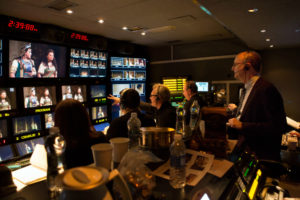
Editorial: Why We Must Heed Peter Gelb’s Warning & Demand Continued Government Support For the Arts
By David SalazarDuring this weekend’s broadcast of “I Puritani,” Metropolitan Opera General Manager Peter Gelb was given the floor to talk about the company’s upcoming 2017-18 season, which was announced this past Wednesday.
But instead of launching into his offerings, Gelb moved in a different direction, turning his attention toward the social-political challenges facing arts institutions.
“I think it’s really important that people be aware of this: The possibility of losing the arts on the radio, losing the arts on television, losing the arts altogether is very real if these cuts were to go through,” Mr. Gelb said.
He was referring to the recent announcement that the White House was intending on cutting support the Corporation for Public Broadcasting and the National Endowments for the Arts and the Humanities. Both entities are critical to the success of major arts organizations and their proliferation around the country.
According to the NY Times, Gelb made light of the fact that the CPB was crucial in allowing the Met to broadcast weekly shows across 500 radio stations in 46 states. He also made sure to let listeners understand that killing the NEA is harmful to smaller companies that rely on grants and help from the endowment to survive week in and week out.
The White House has stated that money should go into greater infrastructural priorities in order to help create more jobs, but they neglect one major aspect of what the nullification of the CPB and NEA would do.
The arts provide employment to millions of people. The NEA’s research from 2014 brought that number to 2.1 million and that only referred to “artists.” The analysis does not take into account the other people involved in arts organizations such as box office attendants, customer service specialists, administrators, managers, ushers, backstage workers, electricians, assistants… If The list probably continues to go on and on and on.
The point is, the arts are a major source of job creation. Killing them the way the current administration seems hellbent on doing is not going to help the American people get jobs.
In a world where technology is essentially making people irrelevant, the arts is an industry that still relies on people. Even if machines could act or sing, who would want to sit through the same exact performance day after day.
And arts are not just about arts for arts sake. In a world where inbound marketing is crucial to the survival of any business in a highly competitive world, creatives are more essential than ever. Just look at Chase for example. The banking company has a blog which is harnesses as a marketing tool to connect with people. But it needs creative writers to help it continue creating new content so that customers do not grow bored or uninterested with what they produce. And this is only one example.
The arts provide people not only a fountain of creativity, but also differing perspectives that are essential to the growth and development of a free world. For people like myself in New York, this is not as big a problem as it is arguably the cultural and artistic capital of the world. But think about more remote locations where art is far rarer? Where there might only be one organization providing people with a diverse storytelling experience? They wind up with none of that, the narrative falling into the complete control of those in power. They control the culture and its development.
The United States of America cannot take that step. Not unless the plan is to undo all our progress and development as a nation.
I understand that many may not hold the implied political leanings of this article. But I am willing to bargain that anyone reading this site cares about opera and its crucial importance to society and its future. This is a call for us to let those who represent us know that we want to protect the arts and all they represent both politically, culturally, economically and socially for our country.
Categories
Editorials

